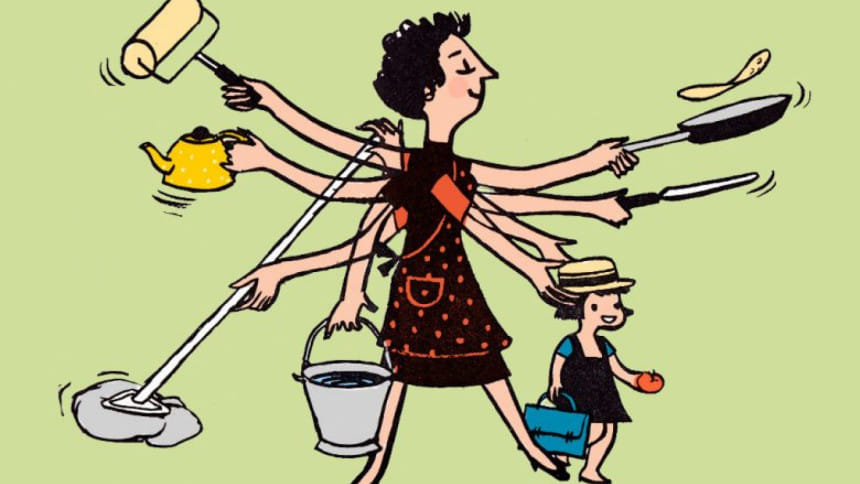Homemakers’ Contributions: UNNOTICED, UNSUNG, UNPAID

Kazi Fatima Sharmin (not her real name) has to wake up at 7:00am every day to make breakfast for her husband.
And before going to bed around midnight, the 31-year-old housewife, on an average, completes at least 17 different household chores, from cooking and mopping floors to cleaning toilets.
Still, all this hard work goes unnoticed by her other family members.
“It really hurts when even my husband says that I don’t do anything at all. The numerous things I do every day means absolutely nothing to him,“ said Sharmin, while struggling to hold back her tears.
No recognition, no respect and no payment. That’s precisely the story of the many Sharmins who toil day and night in households across Bangladesh.
According to UN women expert Shahra Razavi, such unpaid care work is the kind of work that people do to take care of each other and build up each other’s capabilities. The main characteristic of unpaid work is that it is not directly remunerated.
“One universal fact seems to be that in nearly all human societies, it is often upon women this kind of work falls. It’s highly feminised. The unequal distribution highly penalises women,” says Shahra in a video released by UN Women in 2017.
“Taking on the bulk of this work often carries a penalty in terms of not being able to have a full-time job with a decent wage, not being able to accumulate a pension, the benefits that come from formal sector employment. The penalties are many even though the benefits to the society are huge.”
Take the case of Mahbuba Sultana Shampa, who had to sacrifice her career for raising her child.
When her daughter was born, she saw no option but to take a break from work. Her husband is a lawyer and there was no one else in her family to take care of the baby.
“Initially, I used to carry my child to an NGO where I worked, but my colleagues seemed annoyed. That’s why I resigned, “ said Shampa, who had chosen to work in the development sector despite passing the bar examination.
Shampa said she received several job offers later, but had to turn all them down as her responsibilities would involve field visits.
“I am a complete homemaker now,” she said, adding she spends most of her time cooking and taking care of her daughter.
Talking about campaigns for recognition of unpaid care work, UN expert Shahra said one misconception was that the campaigns sought wages for homemakers. This is absolutely not the case.
“To really value this work, I think what is really important is to appreciate its significance. This work is what makes the society and economy run. In many ways this kind of work can be seen as the solid foundation on which official industries, services, economies, schools and universities sit on. Without this kind of work, it would be very difficult to think of a society that can function,” Shahra is seen saying in the video.
Ferdous Ara Rumee, secretariat coordinator of the National Committee on Rural Women’s Day Celebrations, said, “No one is asking for payments as a remedy to lessen the burden on women. Rather, the focus is on the four Rs: recognition, redistribution, reduction, and representation. The unpaid care work must be acknowledged as labour.
“There is no way to avoid it but these works can be fairly shared with the male members. Community and state can take a greater share by providing public services e.g. quality day care centres. In this way, the burden can be reduced from women’s shoulders and they might save some time to engage in other productive works.”
Rumee shed light on the numerous activities that rural women take on in farming, fisheries and livestock.
“A labourer has to be paid at least Tk 400 and one meal a day. So in villages, farmers use their wives for numerous tasks related to agriculture, but those are unpaid. Women’s labour is seen as means to reduce crop production cost,” she said.
Besides, aid group Oxfam reveals that in Bangladesh, women’s ownership of land is five times less than that of a man though women perform 17 out of 22 activities required for rice production.
Women experts said unpaid care work should be captured in the GDP (gross domestic product). But sadly, that is yet to happen in Bangladesh.
“Women’s unpaid care work is recognised in the sustainable development goals, but little has been done in practical terms to give it a concrete shape,” says Banasree Mitra, who has been leading the campaign “Equality through Dignity” of Manusher Jonno Foundation since 2012. The campaign aims to highlight the contributions of women in families, societies and state.”
“Just because the household works are not remunerated, a woman cannot be looked down upon. In a research done in association with Centre for Policy Dialogue, we found that if these works were monetised, they would have been around 76 percent of the GDP in fiscal 2013-14,” Mitra said.
“So we are pressing the government to include the household works in the GDP,” the gender specialist said.
Mitra added: “Take RMG workers for example. Clearly they are playing a huge role in the macro economy. But is a female RMG worker leading a dignified life? Is she safe at her workplace and home? Is she respected in her family? She is earning money but she is not being able to spend that money according to her will. She does not have any decision-making power. So she is not leading a dignified life despite having financial independence. That is why we are saying that we want to reach equality but through dignity.”

 For all latest news, follow The Daily Star's Google News channel.
For all latest news, follow The Daily Star's Google News channel. 



Comments